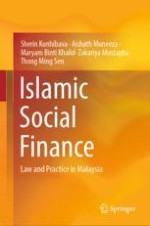2024 | OriginalPaper | Chapter
2. Sadaqah, Zakat and Qard Hassan: Legal Framework
Authors : Sherin Kunhibava, Aishath Muneeza, Maryam Binti Khalid, Zakariya Mustapha, Thong Ming Sen
Published in: Islamic Social Finance
Publisher: Springer Nature Singapore
Activate our intelligent search to find suitable subject content or patents.
Select sections of text to find matching patents with Artificial Intelligence. powered by
Select sections of text to find additional relevant content using AI-assisted search. powered by
